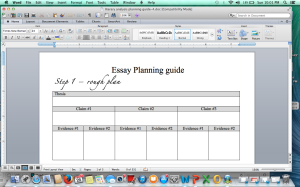The first year that I was in the classroom I was surprised when I assigned a writing task on the play, “The Crucible” that many of the kids were excited to express their feelings about the antagonist, Abigail and protagonist, John. For an entire class period we walked through the writing assignment and discussed possible ways to start the essay and I had enjoyed hearing the students discuss key events that occurred in the plot. However, the day that the assignment was due I was disappointed in not only the amount papers I received, but the quality of work that was turned in as a final draft. Some essays had not been typed (despite being given time to do that during class), many had not used textual evidence to cite their source while others didn’t bother to turn in anything.
When I questioned students about why many students did not complete the assignment in its entirety, many students admitted that once they had to work without me they didn’t know what to write-even after reading the play and watching the movie version. As I contemplated what my next move would be in this assignment, I thought about the one thing ALL of my students had in common was that many (if not all) of them were also struggling students. Some struggled due to their reading abilities, while others struggled to behave appropriately in class. While it would have been easier for me to just ‘scrap’ the assignment and start the next unit, I decided I needed to show the students that writing was not a negotiable assignment so I got to work. As I worked through that assignment for the next four (extended) weeks, I learned some valuable lessons that I carried over the next 13 years when I assigned writing to students who struggle academically and behaviorally.
In my current role as an Instructional Coach, these are strategies that I try to give teachers who are experiencing some of the ‘growing’ pains I endured as I assigned writing tasks to students. While these strategies may not apply to all students, these strategies have helped me get almost 100% of my students to submit their writing assignments!
1.Create writing tasks that matter. Before you actually assign the writing task, make sure you brainstorm ways to make topics that students will be excited to answer. For example, when assigning a piece of writing on Oedipus the King, I knew I wanted to make the assignment an analysis, but I wanted to choose a topic that made students excited to write ! So I gave the students options that required them to analyze what they had previously read. In addition to the options, I was always careful to frame the assignment so that students actually knew their role in the assignment. Here are a few that I used..
Overview:You have just been assigned to the Thebes Medical Examiner’s Office by King Creon. He is anxious to investigate the issues that led to Oedipus Rex’s downfall so he has assigned teams of investigators to tackle various issues in the found in the Lead Investigator’s Report.
Task: Using everything you have learned from reading “Oedipus the King” and the elements of a tragic hero, you will write a well-developed essay to showcase your thorough understanding of not only Oedipus, but the events and characters surrounding his fall.
“Prompt 1: Create a well-developed essay in which you showcase your understanding of irony (verbal, dramatic, OR situational) as presented in Oedipus Rex. Choose one quote from the play and prove how this quote serves as a prime example of irony and how it carries great significance in the context of the entire play. Be sure to use textual evidence to support your analysis of the irony present in the play.
Prompt 2: The theme of blindness and sight is introduced in Part I of the play. Some characters have literally lost their sense of sight, while others do not see, or understand, the consequences of their actions. Write an essay in which you analyze how the theme of blindness and sight is used to complicate the plot of the play. Be sure to use textual evidence to support your analysis.
Prompt 3: The number three appears several times throughout the play. Laios is killed where three roads meet. Oedipus is three times damned: “. . . damned in birth, damned in marriage, and damned in the blood he shed with his own hand.” Clues to unraveling the mystery are brought by three outsiders: Teiresias, the messenger, and the shepherd. Archetypally, the number three represents completeness, closure, unity, awareness, and even spiritual awareness. Defend Sophocles’ use of the number three as further evidence that Oedipus is an archetypal hero.
Prompt 4: The Greek word “Tyrannos” is an absolute ruler who has seized power, not inherited it. He is not a king (or rex), since a king succeeds to the throne by birthright; the tyrannos succeeds through intelligence, force, and influence – through ACTION. How does the title “Tyrannos” reflect Oedipus’ reign over Thebes? How does it reflect one of the most powerful ironies in the play?
By the time I gave this assignment to the students were actually excited (and intimidated) to discuss these very different topics. That was the first hurdle (after reading the book) that I conquered. Students knew their roles, their questions and the process required to answer the question(s) appropriately.
2. Spend time ‘breaking down’ the writing prompt and analyzing how to decipher key words. Now once you give topics like the above, it was critical for me to take time to literally break down the prompt with the students. The first thing I would do is allow the kids time (5-10 minutes) to decide which question they wanted to answer and have them sit according to their question. Sometimes when questions appeared easier compared to others, I would have to limit the amount of people who could pick a particular essay focus. I would then do whole group instruction on how to break down the prompt. I used either my overhead or my Promethean board to underline verbs, key words and ‘trigger’ words for the kids to identify.
As I worked with the prompt, I would call member of the various groups up to help analyze the prompt and to serve as scribes so that I could walk around and monitor the student’s notes and redirect any negative behavior. During this stage, I’ve noticed that my students who struggle the most, seem to disengage the easiest. So to deter that behavior, sometimes I’ll have them come up and become the scribe for a particular lesson. Or I’ll give them some guided notes to make sure they’re not overwhelmed. In extreme cases, I would have to teach the class in class proximity to that student(s). Also, during this stage of ‘breaking down’ the prompt, I take time to relate the question to things that I know are happening in their life, pop culture, etc.

3. Use a GRAPHIC ORGANIZER. One of the things that a struggling reader needs is the ability to plan out their essays and research the text to appropriately answer the prompt. In my early years of teaching I used the standard writing graphic organizer with three stems, but I found that graphic organizer did not do anything to help my students actual outline/write their essay. A couple of years ago I was stalking the internet looking for a more detailed graphic organizer when I came across this Essay planning guide-4. While it was pretty straight forward, I found it was PERFECT for a struggling reader because it caused them to refer back to the text we were reading to really create an outline for their essay. This graphic organizer was so detailed that students could not write meaningless analysis of the questions instead it required them to think.

When I first introduced this to my students they freaked out and I had to take serious time from class to just get them comfortable with a graphic organizer that was so detailed. So one strategy I used was to introduce this graphic organizer by having the kids complete a ‘dummy’ thesis using a topic that was high interest question such as, “Who is your favorite musician?” Once I showed them how to complete the planning guide, the easier it became for them to apply it to a text. Honestly using this graphic organizer will take some getting used to and required me to work with students in small groups (grouped by essay question) and to circulate around the room, offering feedback and constantly reassuring students that they are actually completing the graphic organizer correctly.
4. Have writing exemplars available for students to look at while they write. Every year I kept samples of writings for students to look at, analyze and refer to as they write their own essays. Before I ‘released’ these essays for students to look at, I was careful to ‘black out’ names and class periods and any other identifying items. These exemplars were kept in a location in my room where all students can get access to them.
Students understood that these essays were to help them and at NO TIME could they use any part of the essay and write it in their essay. If a student had difficulty getting started, I would always refer them to read/look at an exemplar for inspiration. If many of my students are struggling I would use one of the exemplars to break apart in class via my document camera or overhead.
5.Spend time in class explicitly teaching the writing skills needed to write the essay/paper. Before I assigned any essay, I had already taught my lesson(s) about how to write an essay, but with any struggling writer, it’s critical that I reinforce what I had taught. Instead of trying to spend 3/4 of the class period reteaching daily, I started each class with a mini lesson on the elements needed to make the essay a success. During these mini lessons I gave students examples with the essays they were currently working on and allowed students to ‘practice’ their skills with something that is ‘real’ with them.
6.Allow students to revise their writing. When I first started teaching, I was adamant about once a writing assignment was due, it was due. However, I had to remember that writing is a process and a process means that you can continually revise the product until you master the standard. So in my class, students knew that any time if they needed extra points it would from them revising prior writing assignments. When students were writing their rough drafts in class, I always encouraged them to revise their essays and offered feedback for them as they struggled with certain parts of the assignments. To further bring home the importance of the writing process, I never accepted a final draft without a graphic organizer or rough draft.
7.Use a rubric to show students what the expectations are for the finished project. For every writing assignment that I gave, I always gave my students a copy of the rubric that was required before I would accept a final project. I took time out of class to go over the rubric and to show students the expectations of the final project.
8. Once students turn in their paper, give them detailed feedback about their areas of improvement and allow them to revise the finished product. As a new teacher it was hard trying to figure out how to give feedback on 165 papers within a restricted time period. In the beginning I was up all night giving feedback, but after a couple of years of doing that I was burned out. So I started to implement some other strategies such as: stagger the due date of assignments based on classes, only allow students to turn in their final drafts via Google Docs or grading a certain amount of papers per day to have a vast amount of papers graded within a two weeks period.
All of these strategies are not only tedious, but require a lot of patience and planning on the part of the teacher and student. So take some times and remember that writing is a process not a destination!






